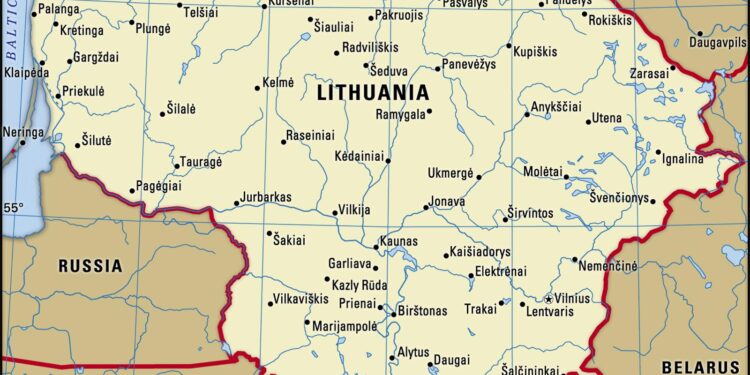Lithuania has taken the escalating migration crisis to the international stage by filing a complaint against Belarus at the International Court of Justice in The Hague. Accusing Minsk of deliberately orchestrating the influx of migrants across their shared border as a form of hybrid warfare, Vilnius aims to hold Belarus accountable for weaponizing human flows to destabilize the region. The move marks a significant escalation in tensions between the two neighboring countries and highlights the growing use of migration as a geopolitical tool in Eastern Europe.
Lithuania Files International Complaint Against Belarus Over Migrant Crisis
Lithuania has escalated its response to the ongoing migrant influx by officially lodging a complaint at the International Court of Justice in The Hague, accusing Belarus of deliberately orchestrating a migrant crisis as a form of hybrid warfare. The Baltic state claims Belarus has systematically facilitated the illegal transit of thousands of migrants across their shared border in retaliation against European Union sanctions. This move marks a significant legal step as Lithuania seeks accountability for what it describes as “weaponized migration” aimed at destabilizing the region and undermining EU unity.
Authorities highlight key concerns including:
- Human rights violations: Migrants caught in harsh conditions at the border without adequate humanitarian support.
- Security threats: Strain on Lithuania’s border control and public services amid escalating arrivals.
- International law breaches: Belarus’s alleged intentional facilitation of irregular migration as political leverage.
| Aspect | Belarus Actions | Lithuania’s Response |
|---|---|---|
| Migration Flow | Increased | Border fortification |
| International Legal Steps | Denied allegations | Filed complaint at ICJ |
| Humanitarian Assistance | Limited provision | Emergency support centers |
Examining the Weaponization of Migration as a Geopolitical Strategy
In a bold move signaling an escalation in diplomatic tensions, Lithuania has formally brought a case against Belarus to the International Court of Justice, accusing Minsk of deliberately weaponizing migration flows to destabilize its neighbor. This tactic involves orchestrating the mass movement of migrants and refugees across the Lithuania-Belarus border, thereby creating humanitarian crises and pressuring Lithuania’s political and social infrastructure. The Lithuanian government argues that Belarus is exploiting vulnerable populations as pawns in a broader geopolitical contest, leveraging irregular migration to challenge EU unity and test the resolve of European migration policies.
Key elements of this strategy include:
- Coordinated transportation of migrants to the border regions
- Use of misinformation and border infrastructure manipulation
- Targeting EU member states to expose policy vulnerabilities
| Impact Area | Effect | Response |
|---|---|---|
| Humanitarian | Strain on refugee services | Emergency aid and shelter expansion |
| Political | Heightened diplomatic tensions | Legal action at The Hague |
| Security | Border vulnerabilities | Increased patrols and technology deployment |
Calls for Stronger EU Responses to Prevent Hybrid Threats at the Borders
The escalating tensions along the EU’s eastern borders have drawn sharp attention to the urgent need for enhanced collective strategies. Lithuania’s recent decision to bring Belarus before the International Court of Justice signals a potent challenge against the weaponization of migration as a tool of coercion. The Baltic nation accuses Belarus of orchestrated efforts to funnel migrants into EU territories, aiming to destabilize the region politically and socially. This move underscores broader concerns within the bloc about the effectiveness of current border controls and the resilience of existing legal frameworks against hybrid threats.
EU officials and security experts alike have called for a multi-layered response, emphasizing coordination across agencies and member states. Key measures proposed include:
- Enhanced intelligence sharing to detect and counter hybrid tactics early.
- Increased funding for border security infrastructure and rapid response teams.
- Legal reforms to empower swift action against state-sponsored destabilization efforts.
- Stronger diplomatic engagement to hold perpetrators accountable on international platforms.
| Action | Purpose | Expected Outcome |
|---|---|---|
| Intelligence Sharing | Detect Hybrid Threats | Early Warning System |
| Border Infrastructure | Improve Physical Security | Reduced Illegal Crossings |
| Legal Reforms | Increase Enforcement Capacity | Swift Justice |
| Diplomatic Efforts | International Accountability | Deterrence Effect |
In Retrospect
As Lithuania escalates its legal challenge against Belarus at The Hague, the case underscores the growing tensions between the two nations amid ongoing geopolitical strife. This landmark move not only highlights the complexities of migration as a tool of statecraft but also signals a broader push within the international community to hold states accountable for weaponizing human displacement. Observers will be closely watching the proceedings, which could set significant precedents for how migration crises are addressed under international law.










![Azerbaijan reaffirms support for Somalia’s sovereignty at OIC emergency meeting [PHOTOS] РAzerNews](https://europ.info/wp-content/uploads/2026/01/3037165-azerbaijan-reaffirms-support-for-somalias-sovereignty-at-oic-emergency-meeting-photos-azernews-120x86.jpg)





